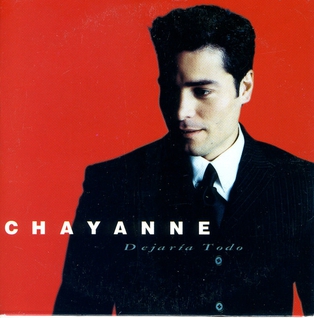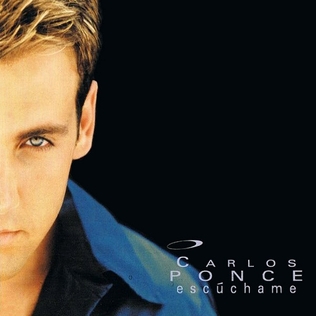
Vuelve is the fourth studio album by Puerto Rican singer Ricky Martin. Sony Discos and Columbia Records released it on February 12, 1998. Martin worked with producers KC Porter, Robi Draco Rosa, and Desmond Child to create the album. Following the worldwide success of the song "María" from his previous album, A Medio Vivir (1995), Martin returned to the studio and began recording material while on tour. Vuelve is a Latin record with Latin dance numbers and pop ballads. "María" caught the attention of FIFA, who asked Martin to write an anthem for the 1998 FIFA World Cup being held in France. Martin subsequently recorded "La Copa de la Vida", composed by Porter, Rosa, and Desmond Child for the World Cup.

"Si Tú Te Vas" is a song by Spanish singer Enrique Iglesias from his 1995 eponymous debut studio album. The song was co-written by Iglesias when he was 16 and his friend Roberto Morales with Rafael Pérez-Botija handling its production. It was released as the lead single from the album in October 1995. Iglesias recorded a demo of the song which was accepted by Guillermo Santiso, the president of Fonovisa Records, which led to Iglesias signing on with the company. A pop ballad, the song is about a man inspired by love and is afraid of a farewell. A music video for the song was filmed in New York and led to Iglesias being nominated for Best New Artist at the 1996 MTV Latino Awards.

"Esperanza" is a song by Spanish singer Enrique Iglesias for his third studio album Cosas del Amor (1998). It was co-written by Igleias and Chein García-Alonso with Rafael Pérez-Botija handling its production. A power ballad, it is a confessional song of love and forgiveness. Upon "Esperanza"'s release, one reviewer lauded Iglesias's vocals and the song's arrangements while another found it too similar to his debut single "Si Tú Te Vas". Filmed in Malibu, California, the accompanying music video for "Esperanza" was directed by Emmanuel Lubezki, which won Video of the Year at the 11th Annual Lo Nuestro Awards in 1999. "Esperanza" also won "Song of the Year" and an American Society of Composers, Authors and Publishers (ASCAP) Latin Award in the same year. Commercially, it reached number one in Guatemala, Nicaragua, and Panama as well as the Billboard Hot Latin Songs and Latin Pop Airplay charts in the United States, while becoming top-five hit in Colombia, Costa Rica, Honduras and El Salvador.
This is a list of notable events in Latin music that took place in 1994.

"No Sé Olvidar" is a song written by Kike Santander and performed by Mexican recording artist Alejandro Fernández. It was co-produced by Santander and Emilio Estefan and was released as the third single from Me Estoy Enamorando by Sony Music Mexico in 1997. The song is a bolero-pop ballad with ranchera influences and portrays the singer desperately trying to forget his lover. A music video was made for the track which features Fernández hopelessly attempting to not remember his lover only to slowly delve into insanity. It received a nomination for Video of the Year at the 1998 Lo Nuestro Awards.

"Te Conozco Bien" is a song by American singer Marc Anthony from his second studio album, Todo a Su Tiempo (1995). The song was written by Omar Alfanno, with production being handled by Marc Anthony and Sergio George. It was released as the first promotional single from the album on May 30, 1995. A salsa song, it sees the singer express certainty that someone is regretful. The song was awarded the Billboard Latin Music Award in 1996 for "Hot Latin Track of the Year" in the Tropical/Salsa field and was nominated for the Tropical Song of the Year award at the 8th Annual Lo Nuestro Awards in the same year. It was a recipient of the ASCAP Latin Award in 1996. Commercially, the song peaked at number seven on the Hot Latin Songs chart and number one on the Tropical Airplay chart in the United States. It was the best-performing song of 1995 on the latter chart. The song was covered by Puerto Rican singer Ángel López as a ballad on his studio album Historias de Amor (2010).
"Hay Que Poner el Alma" is a song written by Omar Alfanno and performed by Puerto Rican singer Víctor Manuelle on his 1996 self-titled studio album and was released as the lead single from the album. It became his first number song on the Tropical Airplay where it spent six weeks on this position and was the second best-performing tropical song of 1996. José A.Estévez, Jr. of AllMusic listed the song as one of the album's highlights. "Hay Que Poner el Alma" won "Tropical Song of the Year" at the 1997 SESAC Latin Music Awards which was presented to Alfanno.

"Dejaría Todo" is a song by Puerto Rican singer Chayanne from his ninth studio album, Atado a Tu Amor (1998). The song was written and produced by Estéfano and released as the lead single from the album in September 1998 by Sony Discos.The rock ballad details everything the singer is capable of doing for his lover. The song received generally positive reactions from music critics and is listed among Chayanne's best songs. A music video for the song was filmed and features a dark scenery. Commercially, it topped the Billboard Hot Latin Songs and Latin Pop Airplay charts in the United States. The track was nominated for Pop Song of the Year at the 11th Lo Nuestro Awards and Song of the Year at the inaugural Ritmo Latino Music Awards in 1999 and was acknowledged as an award-winning song at the 2000 Broadcast Music, Inc. (BMI) Latin Awards.

"Escúchame" is a song by Puerto Rican entertainer Carlos Ponce from his second studio album, Todo lo Que Soy (1999). The song was written and produced by Marco Flores. It was released as the album's lead single on August 16, 1999, by EMI Latin. A flamenco pop ballad, it features Ponce making a plea to a woman he loves. The song received positive reactions from music critics, who praised its melody and genre. Commercially, the song reached number one on the Billboard Hot Latin Songs and Latin Pop Airplay charts in the United States. The song's music video was filmed in Old San Juan in Puerto Rico and features the artist impressing a woman in a club. A Portuguese-language version of the song was released in Brazil, where it reached number one in several of its cities.
"Desnuda" is a song written and performed by Guatemalan singer-songwriter Ricardo Arjona for his seventh studio album, Sin Daños a Terceros (1998). It was released as a single in 1999. It became his first number-one song on both the Billboard Hot Latin Songs and Latin Pop Airplay charts in the United States. It spent 12 weeks at number one on the latter chart, tying with his other song "El Problema". The song would later became the theme song for the Mexican telenovela Tres mujeres (1999). It was recognized as one of the best-performing Latin pop songs of 2000 by ASCAP. Mario Tarradell of the Dallas Morning Morning News described it as one of the album's "eclectic, provocative cuts". "Desnuda" was nominated in the category of Pop Song of the Year at the Premio Lo Nuestro 2000, but lost to "Livin' la Vida Loca" by Ricky Martin. In 2007, Arjona revealed the origins of the song. The music video was directed by Benny Corral. Although a friend of Arjona, Costa Rican model Vica Andrade declined to appear on the music video.
"Que Alguien Me Diga" is a song by Puerto Rican singer Gilberto Santa Rosa from his 12th studio album, Expresión (1999). It was written by Omar Alfanno with José Lugo and the artist handling its production. It is a salsa track in which the singer is searching for unconditional love. Santa Rosa would later record a ballad version. An accompanying music video features the singer in a dark room surrounded by female musicians. Both versions of the song received airplay on Latin radio stations.










